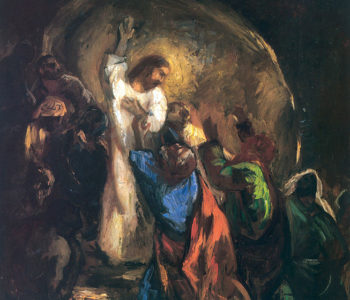 When my youngest son was a toddler, he engaged in a strange activity at my mother’s house. He would stand in the hallway and babble away at something he saw near the door to my father’s home office. A few minutes later, he would tear through the house to the kitchen where he would halt at the top of the steps and continue his prattle in the direction of my father’s workshop. The only problem with this game? My father died when the child was four months old.
When my youngest son was a toddler, he engaged in a strange activity at my mother’s house. He would stand in the hallway and babble away at something he saw near the door to my father’s home office. A few minutes later, he would tear through the house to the kitchen where he would halt at the top of the steps and continue his prattle in the direction of my father’s workshop. The only problem with this game? My father died when the child was four months old.
“Hey Buddy, who are you talking to?” I finally asked one day.
He glanced down the hall as if asking permission to talk before giving me a single word in response. “Ghost,” he said.
Now, I have a firm policy regarding all manner of spooks, spirits and things that go bump in the night. I don’t believe in ghosts and I am fine with it if they don’t want to believe in me. In fact, I prefer it that way. Still, I was perplexed that my not-quite two-year-old came up with that word in the first place and that the two locations in question were heavily associated with a deceased man he didn’t have the chance to get to know.
“Do you suppose it’s possible?” My mother asked me. It didn’t take a genius to see her excitement about what or more precisely who might be behind this.
“I highly doubt it,” I said, peering down the hall, trying to see if there was a shadow or something that might account for the phenomenon. I got down to my son’s level. I tried to see if there was a difference in the morning versus the evening, but no matter what I did, I couldn’t see anything. “I hate to break it to you, but I don’t think Dad has come back from the dead to play with Boy Wonder.”
Whether we like to admit it or not, it’s really hard to believe in things we cannot see. We are human beings who rely on our physical senses to make “sense” of the world around us. We understand that death is final and that no matter how much we may wish otherwise, people do not come back. We may see someone who reminds us of them. We may communicate with them in our dreams, but that’s it. Death is final. In fact, when I learned my father was dying, I begged him to try and come back to tell me what comes after this plane of existence.
“You know I can’t do that,” he laughed. “I think it’s against the rules or everyone would do it. Besides, how would it even make sense to a human?”
I guess that’s why I always have a certain amount of sympathy for Jesus’ followers who struggled with the concept of a risen Christ. It’s not that they don’t want to believe in it, but their first instinct is to say, “show me.”They know about the grisly death Jesus endured. They know normal people can’t come back from something like that and if He did, then can you blame them for wanting to experience something extraordinary for themselves?
If there is one place in the Bible where I really struggle with Jesus’ reaction, it is when He rebukes them for their lack of faith in the days that follow the resurrection. After all, He’s been part of the mortal existence. He should understand the problem. Yes, they saw Him do amazing things, but they also know that He died a horrible death so you can’t blame their skepticism or their desire for physical proof. However, Jesus knows the future of His earthly ministry hangs on this moment. He can’t keep making cameos to everyone who challenges the voracity of his miraculous resurrection. If his closest friends can’t believe in Him, how will anyone else? This is the crucial plot point to the Whole Thing. This is what separates Jesus from every other past prophet. His ability to conquer death is what solidifies his status as the Son of God. If they can’t sell this to the masses, then nothing else matters.
To this day, I don’t know what my son saw in the hallway of my mother’s home, but I’m pretty sure he saw something. Though he is now 21, he clearly remembers his “phantom friend” that appeared as a ball of light and vacillated between one location and the other as if playing a game of tag. “As I got a little older, it didn’t visit as often but I distinctly remember the last time it was there. I knew it would not come back even though it didn’t say so. It just flickered a couple of times as if telling me goodbye and then the light went out forever. I know it sounds crazy, but it was real,” he said.
I may not have seen it. I may not get it. But with conviction like that, I have no choice but to believe him.
Today’s readings for Mass: ACTS 4: 13-21; PS 118:1 and 14-15AB, 16-18, 19-21; MK 16: 9-15
